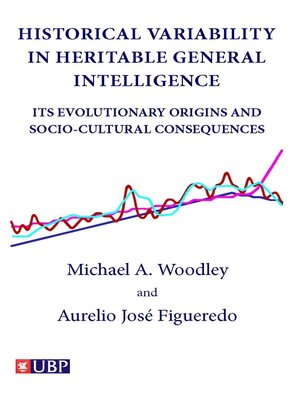Historical Variability In Heritable General Intelligence
ebook ∣ Its Evolutionary Origins and Socio-Cultural Consequences
By Michael A. Woodley

Sign up to save your library
With an OverDrive account, you can save your favorite libraries for at-a-glance information about availability. Find out more about OverDrive accounts.
Find this title in Libby, the library reading app by OverDrive.



Search for a digital library with this title
Title found at these libraries:
| Library Name | Distance |
|---|---|
| Loading... |
It is easy for us to believe that as a society we are getting smarter, at least as measured by IQ tests. This supposed improvement, the Flynn Effect, suggests that each generation is brighter than the last.
If this improvement in intelligence is real we should all be much, much brighter than the Victorians. However, the researchers of this ground-breaking study find the reverse to be true- the Victorians were cleverer than us! IQ tests may be effective at picking out the brightest, but they are not reliable benchmarks of performance over more than a century.
Historical Variance records the exploration of the Flyyn effect hypothesis, which included the use of high-quality instruments to measure simple reaction times (a recognised predictor of intelligence) in a meta-analytic study.
The conclusions are very sobering: far from speeding up, we are slowing down. A decline in general intelligence (a loss equivalent to about 14 IQ points) since Victorian times may have resulted from the presence of dysgenic fertility. These findings, as detailed in Historical Variance, strongly indicate that the Victorians were substantially cleverer than we are today...







